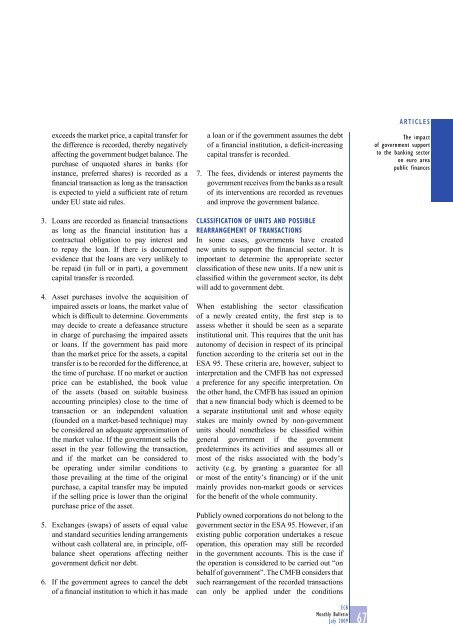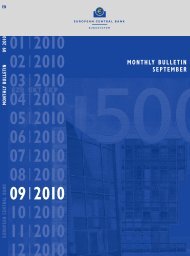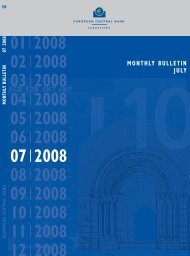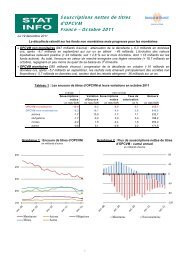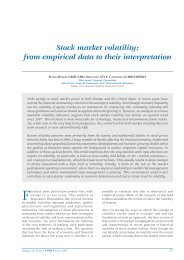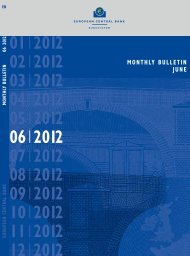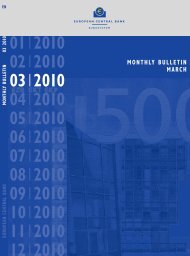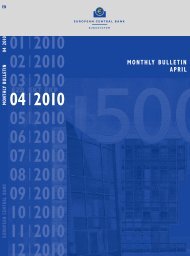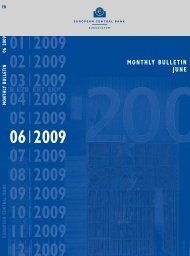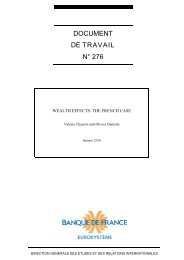Monthly Bulletin July 2009 - Banque de France
Monthly Bulletin July 2009 - Banque de France
Monthly Bulletin July 2009 - Banque de France
You also want an ePaper? Increase the reach of your titles
YUMPU automatically turns print PDFs into web optimized ePapers that Google loves.
exceeds the market price, a capital transfer for<br />
the difference is recor<strong>de</strong>d, thereby negatively<br />
affecting the government budget balance. The<br />
purchase of unquoted shares in banks (for<br />
instance, preferred shares) is recor<strong>de</strong>d as a<br />
financial transaction as long as the transaction<br />
is expected to yield a sufficient rate of return<br />
un<strong>de</strong>r EU state aid rules.<br />
3. Loans are recor<strong>de</strong>d as financial transactions<br />
as long as the financial institution has a<br />
contractual obligation to pay interest and<br />
to repay the loan. If there is documented<br />
evi<strong>de</strong>nce that the loans are very unlikely to<br />
be repaid (in full or in part), a government<br />
capital transfer is recor<strong>de</strong>d.<br />
4. Asset purchases involve the acquisition of<br />
impaired assets or loans, the market value of<br />
which is difficult to <strong>de</strong>termine. Governments<br />
may <strong>de</strong>ci<strong>de</strong> to create a <strong>de</strong>feasance structure<br />
in charge of purchasing the impaired assets<br />
or loans. If the government has paid more<br />
than the market price for the assets, a capital<br />
transfer is to be recor<strong>de</strong>d for the difference, at<br />
the time of purchase. If no market or auction<br />
price can be established, the book value<br />
of the assets (based on suitable business<br />
accounting principles) close to the time of<br />
transaction or an in<strong>de</strong>pen<strong>de</strong>nt valuation<br />
(foun<strong>de</strong>d on a market-based technique) may<br />
be consi<strong>de</strong>red an a<strong>de</strong>quate approximation of<br />
the market value. If the government sells the<br />
asset in the year following the transaction,<br />
and if the market can be consi<strong>de</strong>red to<br />
be operating un<strong>de</strong>r similar conditions to<br />
those prevailing at the time of the original<br />
purchase, a capital transfer may be imputed<br />
if the selling price is lower than the original<br />
purchase price of the asset.<br />
5. Exchanges (swaps) of assets of equal value<br />
and standard securities lending arrangements<br />
without cash collateral are, in principle, offbalance<br />
sheet operations affecting neither<br />
government <strong>de</strong>ficit nor <strong>de</strong>bt.<br />
6. If the government agrees to cancel the <strong>de</strong>bt<br />
of a financial institution to which it has ma<strong>de</strong><br />
a loan or if the government assumes the <strong>de</strong>bt<br />
of a financial institution, a <strong>de</strong>ficit-increasing<br />
capital transfer is recor<strong>de</strong>d.<br />
7. The fees, divi<strong>de</strong>nds or interest payments the<br />
government receives from the banks as a result<br />
of its interventions are recor<strong>de</strong>d as revenues<br />
and improve the government balance.<br />
CLASSIFICATION OF UNITS AND POSSIBLE<br />
REARRANGEMENT OF TRANSACTIONS<br />
In some cases, governments have created<br />
new units to support the financial sector. It is<br />
important to <strong>de</strong>termine the appropriate sector<br />
classification of these new units. If a new unit is<br />
classified within the government sector, its <strong>de</strong>bt<br />
will add to government <strong>de</strong>bt.<br />
When establishing the sector classification<br />
of a newly created entity, the first step is to<br />
assess whether it should be seen as a separate<br />
institutional unit. This requires that the unit has<br />
autonomy of <strong>de</strong>cision in respect of its principal<br />
function according to the criteria set out in the<br />
ESA 95. These criteria are, however, subject to<br />
interpretation and the CMFB has not expressed<br />
a preference for any specific interpretation. On<br />
the other hand, the CMFB has issued an opinion<br />
that a new financial body which is <strong>de</strong>emed to be<br />
a separate institutional unit and whose equity<br />
stakes are mainly owned by non-government<br />
units should nonetheless be classified within<br />
general government if the government<br />
pre<strong>de</strong>termines its activities and assumes all or<br />
most of the risks associated with the body’s<br />
activity (e.g. by granting a guarantee for all<br />
or most of the entity’s financing) or if the unit<br />
mainly provi<strong>de</strong>s non-market goods or services<br />
for the benefit of the whole community.<br />
Publicly owned corporations do not belong to the<br />
government sector in the ESA 95. However, if an<br />
existing public corporation un<strong>de</strong>rtakes a rescue<br />
operation, this operation may still be recor<strong>de</strong>d<br />
in the government accounts. This is the case if<br />
the operation is consi<strong>de</strong>red to be carried out “on<br />
behalf of government”. The CMFB consi<strong>de</strong>rs that<br />
such rearrangement of the recor<strong>de</strong>d transactions<br />
can only be applied un<strong>de</strong>r the conditions<br />
ARTICLES<br />
The impact<br />
of government support<br />
to the banking sector<br />
on euro area<br />
public finances<br />
ECB<br />
<strong>Monthly</strong> <strong>Bulletin</strong><br />
<strong>July</strong> <strong>2009</strong><br />
67


